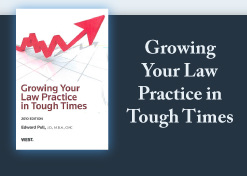|
Contingency Fees –
A Follow-Up on Costs
In a recent Tips column I discussed the challenging problem of how lawyers who charge a contingency fee as a flat percentage of the value recovered for the client in a given matter can cover their expenses in that matter until the value is in fact realized through verdict or settlement. The column drew a positive response from another legal consultant, who asked my opinion on whether a lawyer charging contingency fees should advance the costs for essential case management activities like expert witness fees, depositions and filing fees.
Such costs can add up quickly, and if the lawyer is not successful in the case and no value is recovered, getting the client to pay the out of pocket costs can be difficult at best.
My opinion is that it is better for the client, rather than the lawyer, to advance the costs. Ideally this should be specified in the engagement agreement, but too many lawyers either don't want to ask this of the client or get clients who can't afford to pay except out of the recovery that the lawyer secures. It is valid to ask why any lawyer would accept such a client, but there are a variety of reasons for doing so. The lawyer may simply need the work, even with the risk of having to advance costs, or may be convinced that a substantial recovery is possible.
In such situations, the important considerations are the size and complexity of the case, the amount that needs to be advanced, and the cash reserves that the lawyer has at hand.
Providing in an engagement agreement that the client is responsible for expenses need not preclude accepting a case from a client who has limited means to pay. While lawyers tend not to enforce such provisions during the representation, on settlement or judgment, they often reduce the client's share by the expenses advanced on behalf of the client when stipulated in the engagement agreement. Note that it is not possible to change an engagement agreement once both parties have signed, so if you've not stipulated payment of expenses up front it's too late to add such a provision retroactively.
If the client who has promised to pay expenses while the case is ongoing cannot or will not do so, Rule of Professional Conduct 1.16 allows the lawyer to withdraw from the case as long as the client has been given adequate warning and the withdrawal does not come too close to a court date. However, withdrawing without adequate communication on and careful records of the client's conduct may bring a state bar disciplinary action, and must be done carefully. The best course remains to choose your contingency cases and clients carefully.
|
|

Following the worst economic crisis since the Great
Depression, and facing a sea change in clients' demands
and expectations, law firms must respond and adapt
quickly and effectively. Law firms must choose the kind of
law practice they will be; the marketing and business
development tactics they will use; the overhead that is
critical to their functioning; how to price, bill and collect
for services; and how to manage the cash flow cycle.
Success lies in identifying and capturing the right kinds of
clients, providing the services those clients need in ways
that add value, and ensuring prompt payment and the
ability to grow profits. This book, based on the
experiences of Ed and his clients over 20 years of
coaching and consulting, provides the keys to
successfully thriving in the new era.
Now Available
Special New Release Price: $79
Regular Price: $120
Call or Order Online at:
1-800-837-5880
www.lawbiz.com





|

|
|
|

Personal Commentary
This is the week of peace, joy and goodwill. Ever wonder why it's only for a week? Please accept our best wishes for a very happy and healthy holiday... and a great new year!

Ed Poll
lawbiz.com
lawbizblog.com
www.LawBizForum.com
800-837-5880
Please use the URL below to link to this issue:
www.lawbiz.com/nlimages/tip-12-21-10.html
|

|

What Readers Are Saying...
"No matter how you slice it, there is
no substitute for wisdom and
experience. Ed Poll has
demonstrated both in this eyeopening
book about the essential
elements of running a profitable law
practice. He provides practical
wisdom along with simple ways to
adopt and incorporate best practices
for each. After explaining the pros
and cons of every decision, he makes
recommendations and provides
useful guides disguised as key
principles. Buy the book so you too
can access Ed's wisdom and
experience. It's worth much more
than the investment."
STEWART L. LEVINE. ESQ.,
FOUNDER, RESOLUTIONWORKS
AUTHOR, GETTING TO RESOLUTION;
THE BOOK OF AGREEMENT AND
COLLABORATION 2.0
|

|

|







